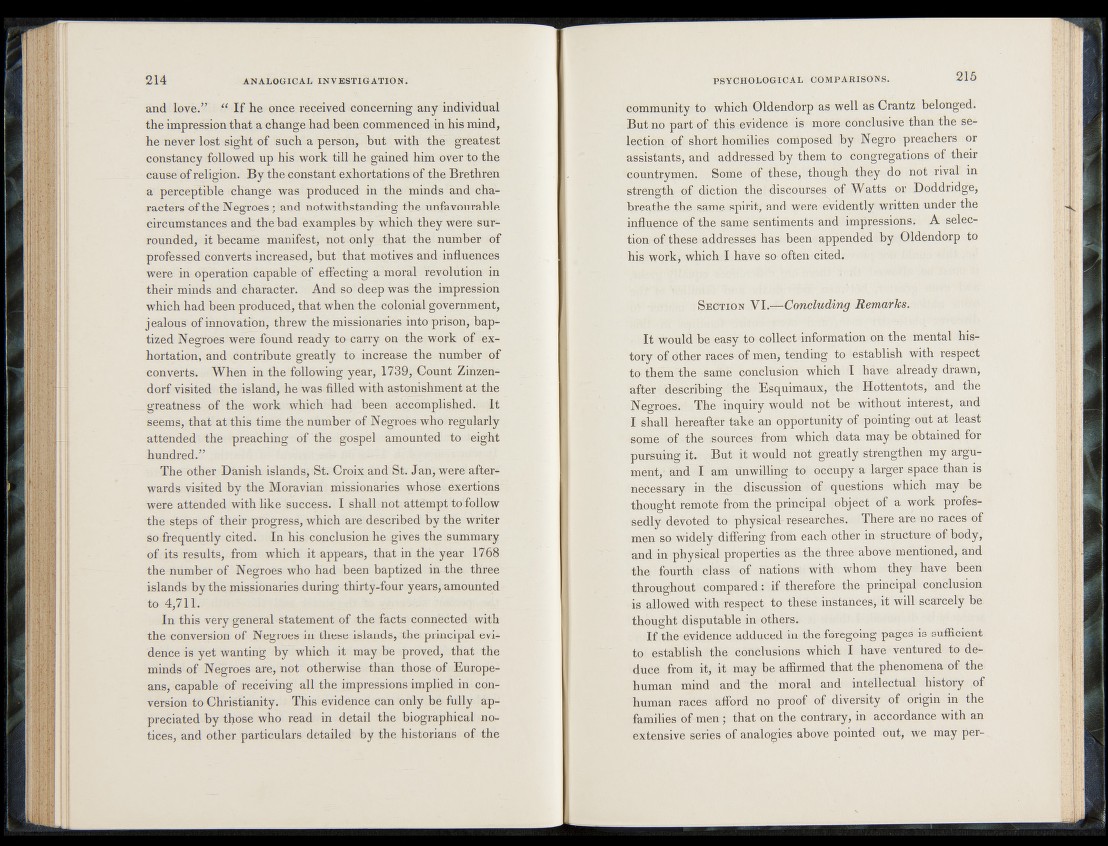
and love.” i I f lie once, reeedved concerning any individual
the impression that a change had been commenced in his mind,
he never lost sight of such a person, but with the greatest
constancy followed up his work till he gained him over to the
cause of religion. By theconstant exhortations of the Brethren
a perceptible change was produced in the minds and characters
of the Negroes; and notwithstanding the unfavourable
circumstances and the bad examples by which* they were surrounded,
it became manifest, not only that the number of
professed converts increased, but that motives and influences
were in operation capable of effecting a moral revolution in
their minds and character. And so deep was the impression
which had been produced, that when the colonial government,
jealous of innovation, threw the missionaries into prison, bapl-
tized Negroes were found ready to carry on the work of exhortation,
and contribute greatly to increase the number of
converts. When in the following year, 1739, Count Zinzen-
dorf visited the island, he was filled with astonishment at the
greatness of the work which had been accomplished .i It
seems, that at this time the number of Negroes- wli^regularly
attended the preaching of the gospel amounted to eight
hundred.”
The other Danish islands, St? Croix and Si, Jan, wereiaftorf
wards visited by the Moravian missionaries whose - exertions
were attended with like success. I shall not attempt tofollow
the steps of their progress, which are described by the writer
so frequently cited. In his conclusion he gives the summary
of its results, from which it appears, that in .the year 17,68
the number of Negroes who had been baptized in the three
islands by the missionaries during thirty-four years, amounted
to 4,711.
In this very general statement of the facts connected with
the conversion of Negroes in these islands, the principal evidence
is yet wanting by which it may be proved, that the
minds of Negroes are, not otherwise than those of Europeans,
capable of receiving all the impressions implied in conversion
to Christianity. This evidence can only be fully appreciated
by those who read in detail the biographical notices,
and other particulars detailed by the historians of the
community to which Oldendorp as well as Crantz belonged.
But no part of this evidence is more conclusive than the selection
of short homilies composed by Negro preachers or
assistants, and addressed by them to congregations of their
^countrymen; Some >of these,' though they , do not rival* in
strength of; diction the* discourses of, Watts oi’ s Doddridge,
breathe the same spirit, and were -evidently written under the
influence of the same sentiments and impressions; A select
tion of these addresses has been appended by Oldendorp to
his work, which I haVe so^oftemcited;- *
S e c t i o n Yl.-ê-Concluding Remarks.
, I t woulâ. be easy to collect-information on the mental history
of other races ofimten, tending to establish with respect
to them the samë conclusion which I have? already drawn,
after .describing the EsquèjËpab*,ythe Hotteniol#|l and the
Negroes. The inquiry would not be* without interest, and
• I shall ,hereafter take.an opportunity of pointing'out -at* teast
some (of^the isources* from which data may k^iobtained for
pursuing it. But it would not greatly (strengthen my argument,'
and I am Unwilling to occupy a* larger, space than is
necessary?in the discussion of questions -which' may be
thought reinoM from the principâlïdobjëèt ©f a work professedly
devoted to- physical-researches. There are-mo races of
men so widely differing from each othOr in-structure of body,
and in-physical* prdpèrties as 4 h©. threeiabove-mentiened, and
the fourth class of nations with whom they have been
throughout compared: if therefore the prinèipal conclusion
4 s allowed with respect to these instances,lit will scarcely be,
thought disputable in others*
If the evidence adduced in the foregoing pages is sufficient
to establish the conclusions ■ which I haye^ ventured, to dek
düce from it, it may- be affirmed that the phenomena of the
human mind and the 'moral andn intellectual history ,of
human races afford no proof of diversity of origin in the
families of-men ; that on the contrary, in accordance with an
extensive series of analogies above pointed out, we may per